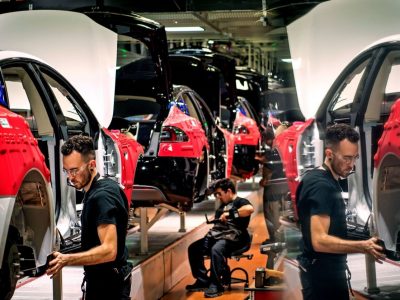The Zombie Myth of Job-Killing Regulations
Legal Planet: Environmental Law and Policy 2024-08-30

With the Labor Day weekend coming up, let’s talk about jobs. Some myths are like zombies in two ways. They refuse to lie down and die, not matter what you do. And if you aren’t careful, they can eat your brain. An example is the idea that environmental regulation kills jobs. Tragically, this brain worm seems hard to root out. But the evidence doesn’t support it. Consider what happened to manufacturing jobs under Trump and Biden, putting aside the COVID era.
Trump was the most anti-regulatory president we have ever had. If Trump’s deregulation did have an effect on manufacturing employment, however, it seems to have been quite small, while manufacturing jobs also grew under the pro-regulatory Biden.
Here are the numbers. According to BLM statistics, there were 12.3 million U.S. manufacturing jobs at the end of 2016 at the end of Obama’s presidency. After frenzied deregulation by Trump, there was a small increase. Just before COVID struck, we were up to 12.8 million manufacturing jobs in December 2019, an increase of less than 4%. At the end of 2023, after COVID and three years of strenuous regulatory action by Biden, manufacturing jobs had risen again to nearly 13 million, higher than Trump’s peak number.
A social scientist, of course, would want to control for other factors in determining the effect of environmental regulation on jobs. And in fact, the idea that regulations destroy jobs has been carefully studied by social scientists. The conclusion is that, while regulations destroy some jobs and create others, the net effect is minor.
Given the lack of evidence to support it, why has the idea that regulations are a massive threat to jobs hung on so long? There are three reasons. First, regulated industries have a big stake in promoting this myth. They also have a lot of money to devote to this effort. Second, the connection makes intuitive sense to conservatives, and it’s hard to dislodge such preconceptions in our increasingly tribal society. Finally, layoffs are very visible and easy to attribute to regulation, while new manufacturing jobs don’t carry the same oomph. Just as people overestimate the risks of air travel because crashes are so vivid, they also overestimate the degree of job loss.
Whatever the reason, I’m the myth will live on, despite the inconvenient truth that it’s completely fault. But it’s still worth pointing out the facts in the hope that someone out there might be listening. I guess that’s the job for academics, inside and outside the classroom, even if sometimes you feel half the audience is dozing off.